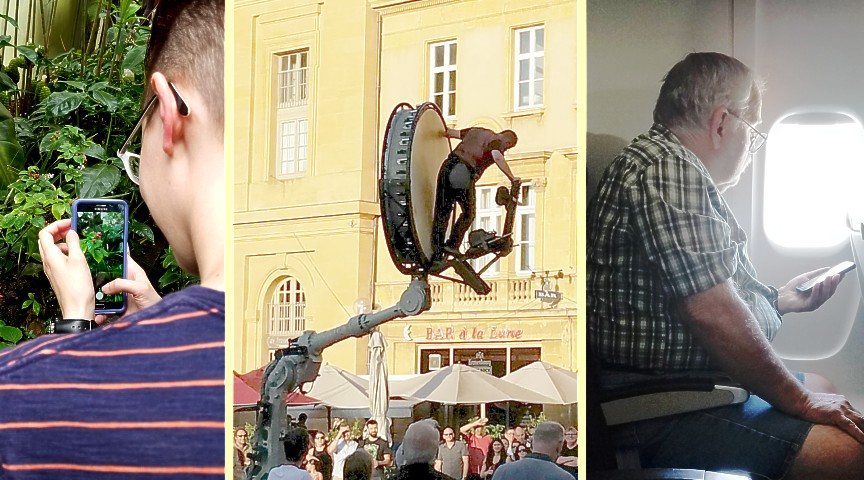Kansas Snapshots by Gloria Freeland - July 28, 2017
Nerds on vacation
A nerd, according to the on-line Merriam-Webster dictionary, is:
an unstylish, unattractive, or socially inept person; especially: one slavishly devoted to intellectual or academic
pursuits.
This definition can be traced back to the invention of the term in the early 1950s.
In contrast, Wikipedia states:
Though originally derogatory, nerd is a stereotypical term, but as with other pejoratives, it has been reclaimed and
redefined by some as a term of pride and group identity.
This �reclaiming,� some have suggested, began with the success experienced by Microsoft Corporation�s co-founder Bill
Gates. A popular Internet piece circulated in the 1990s broke down how much Chicago Bulls basketball star Michael Jordan made
for every game, every shot and even every minute of his career. After the reader was suitably wowed with the astounding
amount this �cool� sports figure was earning, it concluded by noting that Gates, who was in the then-decidedly uncool area
of computer programming, was making about $100 for every one dollar Jordan earned!
Husband Art said similar attitudes were commonly expressed toward engineers when he was young. But the space program,
the personal computer revolution and our ubiquitous fascination with small electronic devices suddenly made the people who
made them somewhat fashionable. This new status for nerd-dom has been bolstered by the fact that while many people leave
college today for entry-level jobs paying $20,000 to $40,000 per year, some beginning engineers, scientists and computer
programmers are receiving six-figure starting salaries.
Even popular entertainment now embraces the nerd. Just a bit more than a decade ago, the Big Bang Theory was strictly a
scientific notion. Only the most unbalanced would have predicted that a television show with the same title about a bunch
of physics geeks would be top-rated for the next 10 years.
As with so many things that were laughed at or spoken about with a bit of derision, once they start becoming cool, almost
everyone wants to join in. People who once thought computers were for nerds, now hate to admit they aren�t proficient at
using them. Many people carry their family photos, contact information and all manner of personal items on their cell phones.
Momentarily misplacing this nerd-created devices has caused more than a few people's hearts to skip a beat, almost as if they
had �misplaced� their children.
Since Art is an engineer and I have been in academia for more than 30 years, it�s hardly a surprise that we are somewhat
nerdy. Unfortunately, our children have confirmed that the other part - being cool - has eluded both of us.
In July, 2014, I wrote a column - "Travel technology" - about how these nerd-instigated
changes had crept into our vacations. Since then, the effect has multiplied. Just like here in the States, post offices
overseas are closing as people use paper letters less and less to communicate. Bed and Breakfast signs are quickly fading as
travelers make sleeping arrangements via the Internet. An area�s attractions are available on-line, posted by area
information offices or business operators, making us wave bye-bye to guidebooks. Sites such as Tripadvisor.com provide
feedback on attractions, hotels, restaurants and other matters trip-related, with the postings done by fellow travelers,
including details about what was liked and not liked.
While Art rarely gets lost, he does use his mapping program to mark where he parks the car when we are exploring a new
place. After a long day of wandering and shopping, the program takes us directly to our vehicle, even suggesting the
shortest walking route.
I have begun using the Duolingo website and application as it painlessly allows me to add some French to my vocabulary.
One day while in France, an electrical storm �killed� our rental place�s TV. No worry! The Internet still worked, so news
and even television shows could be streamed.
Of course, all this new nerdiness does come with some problems of its own. For one, our gadgets are always looking for a
power source to feed them. And if you are trapped between tall buildings, the electronic mapping devices cannot see the
satellites from which they receive their signals. They then become as lost as their owners.
Art also noticed that he has trouble repeating a previous trip without his mapping unit. With attention divided between
the device and driving, he doesn�t notice landmarks as he once did.
Even though Art turned it off, if the car�s internal GPS system thought there was something the driver should know, the
system came on with an announcement. While I guess that was nice, it was also startling and a tad disquieting.
And not all of the phrases that French language program had me practice seemed very practical. I wonder how often I will
have the need to declare I am a whale or a shark!
One evening, we could not connect to the Internet at our place in Metz. Once we become dependent on these conveniences,
it is frustrating not to have them. Art quickly discovered that the nearby security unit was interfering with other devices
and disabled it. But that would have been a real problem for those of us who are less nerdy.
Yet despite our being tired, our gadgets did provide Katie and me an unexpected last-minute chuckle while we were flying
home from Dallas to Manhattan. Glancing over at Art, there he was, holding his phone and looking out the window. He was
using its GPS system to follow our progress, comparing the map on his phone to the landscape out his window.
So while nerds may be unstylish, unattractive and socially inept, the devices they make have made our travels a whole
lot easier and, ultimately, more fun.
